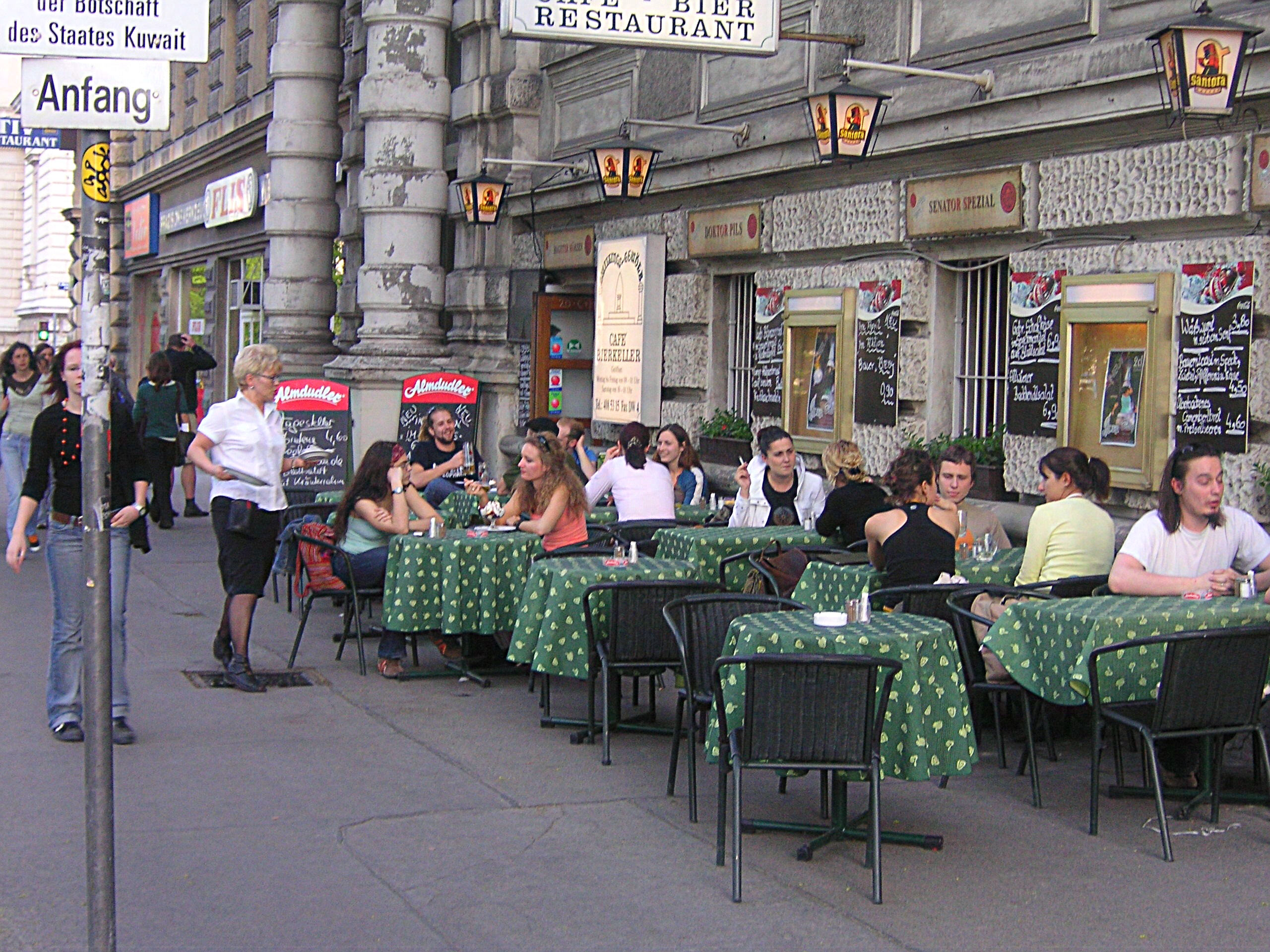Schanigarten on:
[Wikipedia]
[Google]
[Amazon]
 ''Schanigarten'' (plural: Schanigärten) is the
''Schanigarten'' (plural: Schanigärten) is the
Zanoni
in the Vienna city center that extends its Schanigarten over three quarters of the adjacent public square and has set up glass separators to prevent side walk users from crossing the privatized zone. Furthermore, permissions are also granted to set up Schanigärten not on the sidewalk but on the actual driving lanes or parking lanes, reducing the number of available parking spaces.
Wirtschaftskammer Wien - Schanigarten-Leitfaden
(PDF-Datei) Types of drinking establishment
Austro-Bavarian
Bavarian (german: Bairisch , Bavarian: ''Boarisch'') or alternately Austro-Bavarian, is a West Germanic language, part of the Upper German family, together with Alemannic and East Franconian.
Bavarian is spoken by approximately 12 million peop ...
term for tables and chairs set up on the sidewalk
A sidewalk (North American English), pavement (British English), footpath in Australia, India, New Zealand and Ireland, or footway, is a path along the side of a street, street, highway, terminals. Usually constructed of concrete, pavers, brick ...
in front of eating and drinking places. Unlike normal beer garden
A beer garden (German: ''Biergarten'') is an outdoor area in which beer and food are served, typically at shared tables shaded by trees.
Beer gardens originated in Bavaria, of which Munich is the capital city, in the 19th century, and remain co ...
s (''Gastgärten''), the customers actually sit on public property. Originally, ''Schanigärten'' referred only to Viennese coffee houses, but now the expression is used in other parts of Austria
Austria, , bar, Östareich officially the Republic of Austria, is a country in the southern part of Central Europe, lying in the Eastern Alps. It is a federation of nine states, one of which is the capital, Vienna, the most populous ...
and for other types of establishments like restaurant
A restaurant is a business that prepares and serves food and drinks to customers. Meals are generally served and eaten on the premises, but many restaurants also offer take-out and food delivery services. Restaurants vary greatly in appearan ...
s and taverns.
Regulations
In order to operate a ''Schanigarten'', an establishment needs an authorization according to road traffic or trade regulations, which is valid from March 1 to November 15. The Schanigarten is a very attractive proposition for the owners of an establishment as they only pay a very limited yearly fee of several euros per square meter to the municipality. Operations like ice cream stores can thereby effectively multiply their seating area on public property at minimal cost. An extreme example is the ice cream storZanoni
in the Vienna city center that extends its Schanigarten over three quarters of the adjacent public square and has set up glass separators to prevent side walk users from crossing the privatized zone. Furthermore, permissions are also granted to set up Schanigärten not on the sidewalk but on the actual driving lanes or parking lanes, reducing the number of available parking spaces.
History
The origins of the term are unknown. One thread of speculation believes it stems from "Gianni's garden". Indeed a first authorization to put up tables and chairs on the street was given around 1750 to Johann (''Gianni'') Jokob Tarone (''Tarroni''), a former distiller probably of Italians, Italian descent who had opened a coffeehouse on Graben, Vienna, Graben. Another popular tale involves a ''Schani'' derived from the common name ''Hans (name), Hans'' or French: ''Jean (male given name), Jean'' for an apprentice boy or waiter, who was told to "Put up the garden!" He then dutifully obeyed the order by carrying chairs, tables and flower boxes outside.Popularity during Covid-19 Pandemic
With many restrictions in place due to the pandemic, the indoor seating capacity is sharply reduced as to maintain the distance between tables. This causes many establishments to earn less revenues. Adding or expanding the outdoor eating area can help the establishments recoup the revenue. Many cities around the world have allowed the Schanigärten to be set up on the parking lanes in front of the gastronomic establishments. The popularity means the Schanigärten can more or less continue through the winter in some cities in the Northern Hemisphere.References
{{reflistWirtschaftskammer Wien - Schanigarten-Leitfaden
(PDF-Datei) Types of drinking establishment